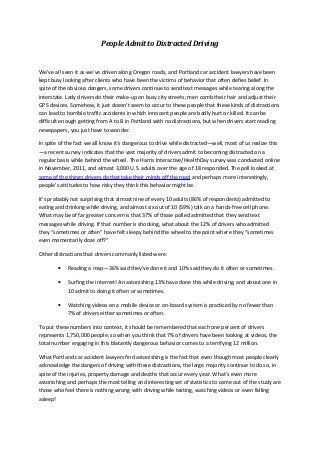
Distracted Driving Study Shows Need for Awareness
- 1. People Admit to Distracted Driving We’ve all seen it as we’ve driven along Oregon roads, and Portland car accident lawyers have been kept busy looking after clients who have been the victims of behavior that often defies belief. In spite of the obvious dangers, some drivers continue to send text messages while tearing along the interstate. Lady drivers do their make-up on busy city streets; men comb their hair and adjust their GPS devices. Somehow, it just doesn’t seem to occur to these people that these kinds of distractions can lead to horrible traffic accidents in which innocent people are badly hurt or killed. It can be difficult enough getting from A to B in Portland with no distractions, but when drivers start reading newspapers, you just have to wonder. In spite of the fact we all know it’s dangerous to drive while distracted—well, most of us realize this —a recent survey indicates that the vast majority of drivers admit to becoming distracted on a regular basis while behind the wheel. The Harris Interactive/HealthDay survey was conducted online in November, 2011, and almost 3,000 U.S. adults over the age of 18 responded. The poll looked at some of the things drivers do that take their minds off the road and perhaps more interestingly, people’s attitudes to how risky they think this behavior might be. It’s probably not surprising that almost nine of every 10 adults (86% of respondents) admitted to eating and drinking while driving, and almost six out of 10 (59%) talk on a hands-free cell phone. What may be of far greater concern is that 37% of those polled admitted that they send text messages while driving. If that number is shocking, what about the 12% of drivers who admitted they “sometimes or often” have felt sleepy behind the wheel to the point where they “sometimes even momentarily doze off?” Other distractions that drivers commonly listed were: • Reading a map—36% said they’ve done it and 10% said they do it often or sometimes. • Surfing the internet! An astonishing 13% have done this while driving, and about one in 10 admit to doing it often or sometimes. • Watching videos on a mobile device or on-board system is practiced by no fewer than 7% of drivers either sometimes or often. To put these numbers into context, it should be remembered that each one percent of drivers represents 1,750,000 people, so when you think that 7% of drivers have been looking at videos, the total number engaging in this blatantly dangerous behavior comes to a terrifying 12 million. What Portland car accident lawyers find astonishing is the fact that even though most people clearly acknowledge the dangers of driving with these distractions, the large majority continue to do so, in spite of the injuries, property damage and deaths that occur every year. What’s even more astonishing and perhaps the most telling and interesting set of statistics to come out of the study are those who feel there is nothing wrong with driving while texting, watching videos or even falling asleep!
- 2. Some amazing statistics When drivers were asked how much, if at all, certain distractions increased the risk of being involved in an accident, researchers were stunned not with the percentage who admitted they knew the risks were high, but the percentage of those who felt the risks were minimal or non-existent. Just some of the examples given by people who drive on a regular basis include: • While 77% said they knew sending or receiving text messages increased the chances of an accident “a lot,” an incredible 5% said it was only a little dangerous and a mind- blowing 3% said this activity was “not dangerous at all.” • Evidently, 8% of the drivers on the road feel it’s only a little dangerous or not at all dangerous to feel sleepy behind the wheel, even if they momentarily doze off! • Reading a newspaper or magazine while driving is seen by 3% of drivers to be completely safe, while a further 4% say it’s only a little dangerous. • Surfing the internet and/or watching videos is viewed to be totally safe by 3% of drivers and only a little dangerous by a further 3%. • Here’s one that Portland car accident lawyers have to deal with on an all-too-frequent basis. One-quarter of drivers admitted to having driven after having two or more alcoholic drinks. No fewer than 7% think this is only a little dangerous and a worrying 4% of respondents said this behavior is not at all dangerous. Driving on Oregon roads is a right and a privilege that many take for granted, not realizing the level of responsibility that goes with that privilege. Part of that responsibility is maintaining the highest levels of concentration and focus possible, to keep yourself and other road users safe. Clearly, many people feel they can either drive quite safely, even when looking at a text message, newspaper or video, or they are willing to take the chance that nothing will happen. Sadly and all too often, however, these kinds of attitudes and behavior lead to thousands of people being injured on Oregon roads every year. Hundreds pay the ultimate price. If you’ve been injured by a negligent driver, regardless of the circumstances, contact one of the very best Portland car accident lawyers around. Experienced personal injury attorneys are not only determined to get their clients the compensation they deserve, but they are equally determined that negligent drivers are punished to the fullest extent and hopefully will not be in a position to injure anyone else through their thoughtless and careless behavior.
